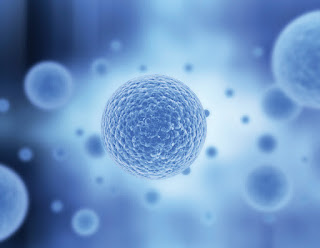Soul entering human embryo at point of conception
Holygraphic quantum-semantic electron microscopy imaging by pixwit.com
D. H. Lawrence wasn't a biologist, but that didn't deter him from sharing his metaphysical speculations on human fertilization and the development of the embryo. And, being primarily a religious thinker, the vital question for him concerned ensoulment; i.e., the moment at which a newly formed human being is animated by the Holy Spirit.
For Lawrence, as for the Pope, just as coition is the essential clue to sex, conception is the crucial act here: the instant that the father-quick fuses with the mother-germ is when a new unit of individuality is born, nine months prior to the birth of the actual baby.
However, we might note that - unlike the Pope - Lawrence also believes in a form of reincarnation via which the souls of the dead re-enter and pervade the souls of the living, breeding thoughts and feelings and ensuring that each person is composed of a multiplicity of forces and so isn't absolutely unique or entirely self-contained.
As interesting as the latter belief is, it's the former notion of ensoulment that I wish to discuss here, examining the view that it occurs at conception and not, for example, at the formation of the nervous system, or when there is measurable brain activity; nor when a tiny heartbeat can be heard, or fetal viability is attained; nor when the newborn is rudely slapped on the bottom and draws its first breath.
It's a view, however, that isn't shared universally. Aristotle, for example, subscribed to a model of epigenesis and believed that ensoulment - in a human sense - only occurred forty days after conception in the case of the male embryo and ninety days after conception in the case of the female fetus, when movement is experienced within the womb. Before this time he held that an embryo had the soul of a vegetable, followed by that of an animal and so couldn't be regarded as a fully human individual.
However, we might note that - unlike the Pope - Lawrence also believes in a form of reincarnation via which the souls of the dead re-enter and pervade the souls of the living, breeding thoughts and feelings and ensuring that each person is composed of a multiplicity of forces and so isn't absolutely unique or entirely self-contained.
As interesting as the latter belief is, it's the former notion of ensoulment that I wish to discuss here, examining the view that it occurs at conception and not, for example, at the formation of the nervous system, or when there is measurable brain activity; nor when a tiny heartbeat can be heard, or fetal viability is attained; nor when the newborn is rudely slapped on the bottom and draws its first breath.
It's a view, however, that isn't shared universally. Aristotle, for example, subscribed to a model of epigenesis and believed that ensoulment - in a human sense - only occurred forty days after conception in the case of the male embryo and ninety days after conception in the case of the female fetus, when movement is experienced within the womb. Before this time he held that an embryo had the soul of a vegetable, followed by that of an animal and so couldn't be regarded as a fully human individual.
Aristotle's views on this question influenced many of the great Christian thinkers, including Thomas Aquinas, who, even whilst conceding that the early embryo did not contain a human soul (one capable of rationality and distinguishing between good and evil), still maintained that aborting it constituted a grave sin (a position which, rightly or wrongly, the Catholic Church has been remarkably consistent on over the years).
It's worth recalling, however, that the ancient Greeks and early Christians knew nothing of fertilization; it wasn't until 1876 that Oscar Hertwig conclusively demonstrated that it involved fusion of two parental gametes and resulted in a genetically distinct zygote. Aristotle believed that the embryo arose exclusively from semen and that the female body merely provided a safe space for the embryo to develop.
Compared to this view, the notion of ensoulment at conception doesn't seem so outlandish; provided of course that one is willing to accept the idea of a non-corporeal and immortal essence animating the human being like some kind of divine breath or spark. Personally, I'm not.
I tend, rather, to share Foucault's more negative, more material view of the soul; as a virtual and historical reality that is produced as an effect of power continually shaping and disciplining the body and which ultimately serves to imprison the flesh. And, like Wilde, I hope that if ever I am to live again it can be as a little flower - no soul, but perfectly beautiful.
It's worth recalling, however, that the ancient Greeks and early Christians knew nothing of fertilization; it wasn't until 1876 that Oscar Hertwig conclusively demonstrated that it involved fusion of two parental gametes and resulted in a genetically distinct zygote. Aristotle believed that the embryo arose exclusively from semen and that the female body merely provided a safe space for the embryo to develop.
Compared to this view, the notion of ensoulment at conception doesn't seem so outlandish; provided of course that one is willing to accept the idea of a non-corporeal and immortal essence animating the human being like some kind of divine breath or spark. Personally, I'm not.
I tend, rather, to share Foucault's more negative, more material view of the soul; as a virtual and historical reality that is produced as an effect of power continually shaping and disciplining the body and which ultimately serves to imprison the flesh. And, like Wilde, I hope that if ever I am to live again it can be as a little flower - no soul, but perfectly beautiful.

